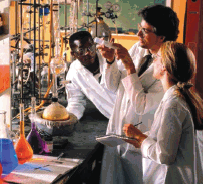|
|
So You Want to be a Scientist |
|
An article in the "Higher Education Supplement" in Wednesday's Australian by Guy Healy as to the possible effect of prospective rankings through the ERA (Excellence in Research for Australia) being driven by Research and Science Minister Senator Kim Carr on postgraduate and overseas students enrollment preferences suggests the questions as to how prospective researchers choose or ought to choose the direction and supervision of their apprenticeships, because as the editor-in-chief of Science, Bruce Alberts* points out: "One normally becomes a scientist through a series of apprenticeships."
Ross Milbourne, vice-chancellor of the University of Technology, Sydney, and chairman of the Australian Technology Network is of the opinion that the ERA results: "will drive student choice a lot more, and drive student enrolments toward the top-performing groups more so than at present." And he believes: "That's a good thing, we want research students to be in the best research environments."
Griffith University's Queensland College of Art head Ross Woodrow opines: "It doesn't matter whether there are league tables because everyone with a ranking above three will broadcast it far and wide. There will be an imperative to do so. Research students, including undergraduates with a discipline they are interested in, will gravitate to those institutions that score fours and fives."
And University of NSW deputy vice-chancellor and Group of Eight research spokesman Les Field told Mr Healy that league tables based on the ERA: "...will start to feed into the international perception of discipline strengths and will feed into student enrolments."
These comments seem to suggest that top university undergraduates interested in pursuing careers in STEM tend to be led like sheep.
Don't you believe it.
Lets start with an observation of one of Australia's outstanding researchers with international appointments and honours -- not in physics.
When I finished [Sydney Technical High School], I was determined to become a physicist and I couldn't have given any better reason than that [one of my parents]showed me physics was a wonderful and honourable profession.
[The first physics lecture I attended at Sydney University was given by Professor May (Robert May a future president of the Royal Society)]. But he only gave the first lecture to the advanced class in physics and then he disappeared to do something more uplifting. And from that point on, things went downhill. If the other physics lecturers had been as good as [Professor May] I probably would have been a physicist.
To return to Bruce Alberts, he makes the crucial point "...it is critical that beginning scientists select their mentors wisely. Unfortunately, what constitutes a "good" choice is not always obvious.... My first piece of advice for graduate students is to begin research training in a laboratory led by a person with high scientific and ethical standards."
And he continues on the theme that working through the pre and postdoctoral years should be predicated on developing the potential of the young would-be scientist.
Often, an established leader who has no more than about a dozen people to manage can best nurture a creative, exciting, and supportive place to work. But carrying out research with an outstanding new professor with a very small group can frequently provide even better training.
In my experience beginning scientists will only gain the confidence needed to confront the unknown successfully, by making discoveries through experiments of their own design. The best research advisers will therefore provide their graduate students with enough guidance to prevent them from wasting time on non-productive pursuits, while giving them the freedom to innovate and to learn from their own mistakes.
[As regards the postdoctoral years:] Scientists at this stage should intentionally try to choose a laboratory where they can acquire skills that complement those they already have.
It is critical [for a successful independent scientist] to be able to design research strategies that are ambitious enough to be important and exciting, innovative enough to make unique contributions likely, and nevertheless have a good chance of producing valuable results.
And finally the EiC of Science has this admonition for the mentors: "Senior scientists have the responsibility of maintaining a system that provides talented young scientists with the opportunity to succeed in whatever career they choose."
I believe that a good argument can be made that the fallout of the ERA in manipulating the university block grant system will be -- if we agree that Professor Alberts ought to be taken seriously -- not only immediately costly -- but downright counterproductive.
______________________________________________
*Professor Alberts, is noted particularly for his extensive study of the protein complexes which enable chromosome replication when living cells divide.

